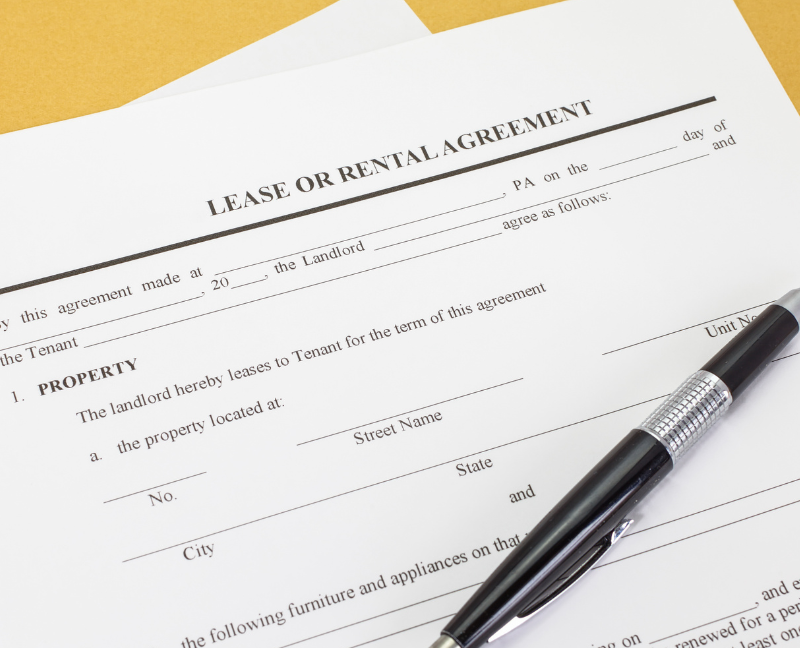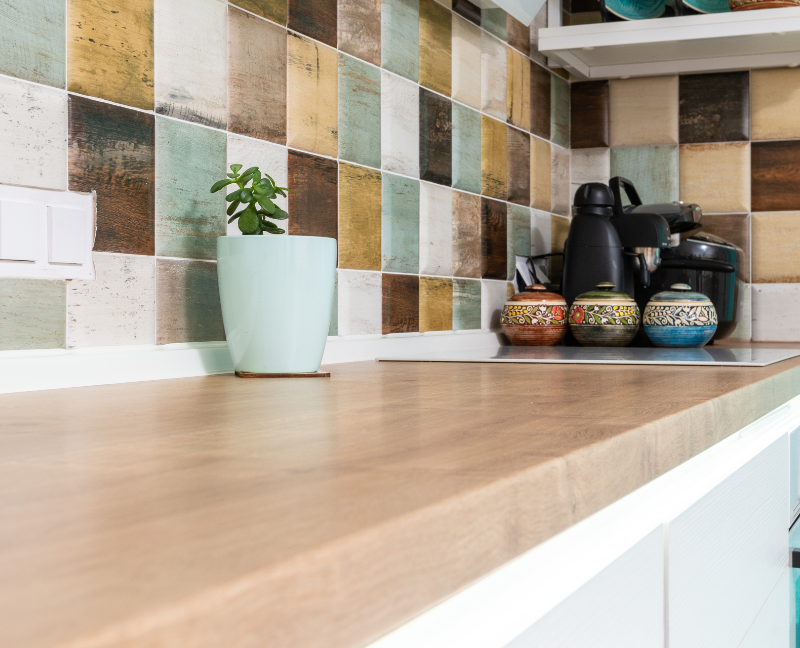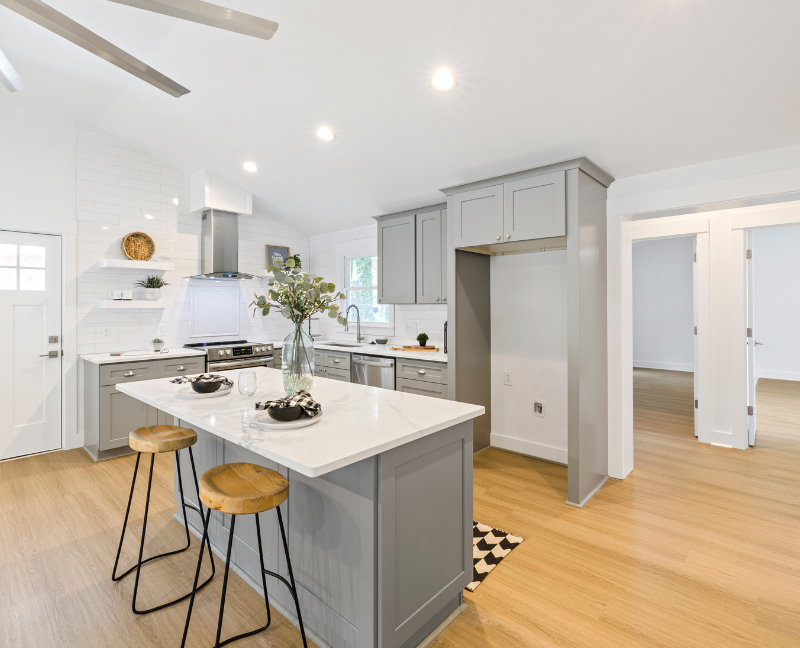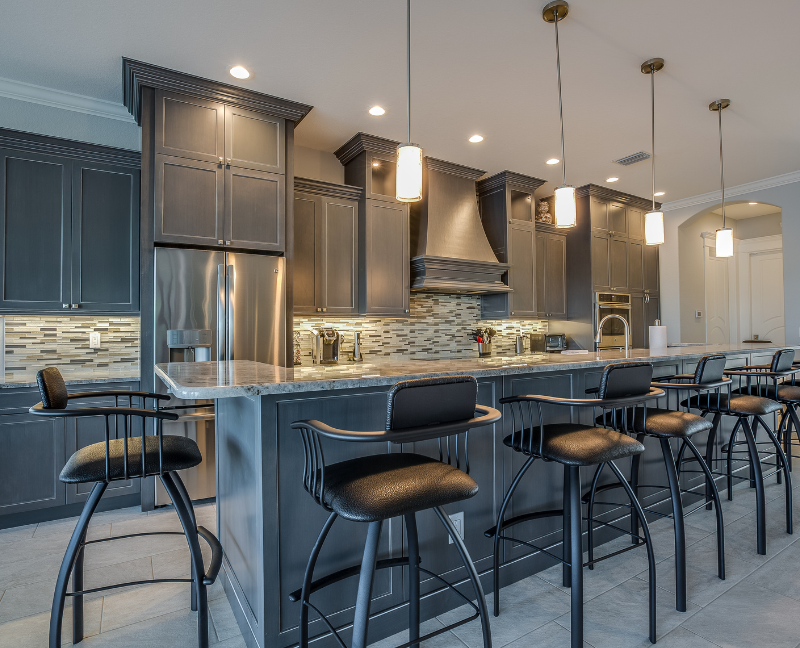Having an additional bathroom in your home can seem like a luxury, particularly if you have a growing family or are having overnight guests.
However, not every shower is made equal. Walk-in, stall, and corner showers conserve space, although they may need compromises.
Think about the sacrifices you might need to make to maintain cleanliness in small spaces, whether you're putting one in a brand-new bathroom or simply thinking about adding one to an already-existing half bathroom.
In a corner shower, even the stylish bathers may get a sense of the glass walls closing in on them. For walk-in showers, it's generally recommended that they provide at least 36 by 36 inches of area. Anything smaller could make you feel a little cramped.
Standard prefab shower kits are well-liked since they don't take up a lot of room and are reasonably priced. Their sizes usually vary from 31 by 31 inches to 36 by 48 inches.
Look for a showroom with models you can enter to determine whether there will be enough space for you to feel comfortable taking a shower before making a decision. But don't just enter and act like you're taking a shower.
Ask yourself: is it easy to reach everything?
Find out if you can bend or stretch comfortably.
If you have a problem doing any or all of these, it’s time to re-evaluate the space of your bathroom.

Having an additional shower might increase your property's value, but there’s no guarantee of that.
Many homeowners believe this – that adding more showers can have a positive effect on the property’s value. However, that relies on the buyer whether they like this or not. There’s no use adding a shower if it’s not going to be utilized.
Therefore, there's a strong possibility you'll be adding value if, for example, you add a brand-new stall shower to a master bedroom that didn't have a master bath and the other homes in the neighborhood don't have one either.
Adding a stall shower to a powder room off the kitchen or in the basement, on the other hand, might not be something buyers will use frequently enough or see the benefit of having.
Consider whether the amount you are spending will yield a return on your investment, just like you would with any home repair, and get the advice of a reputable real estate agent for their perspective.
However, it's not always about turning a profit on a home upgrade. Sometimes the upgrades are just made to make your house more enjoyable. Install and enjoy once you've figured out it's the perfect fit for you and your home, both literally and figuratively!
Without a doubt, real estate closing will always be both thrilling and intimidating for you, regardless of whether you're the one buying or selling the house. Many shocks might be difficult to handle, even when both parties agree on a specific date and may be happy with the money on the table.
The National Association of REALTORS® (NAR) released statistics from its February 2024 REALTORS® Confidence Index Survey, which shows that 11% of contracts had delays in the previous three months and 6% were terminated.
Even though nobody wants to wait around for a real estate transaction to go longer than necessary, there are a few different reasons why your closing date can be postponed. While some problems are comparatively simple to fix, others might not work out at all. Here are five of the most typical issues that cause closings to be delayed, along with management advice for each.
Extended closing times are frequently caused by delayed or rejected finance. Many house purchasers, particularly first-time buyers, are unaware that their loan is still subject to change even after they have already committed to a mortgage and been pre-approved for one month prior. Within a few days of closing, the lender will verify their bank statements and credit report one last time.
If the second verification shows that a new credit line has been opened (for a new car, new house items, etc.), there has been a change in work, or there are other concerns, things could go awry. Keep in mind that, up to the point at which you close on the property, even the slightest adjustments to your financial status could cause issues. Therefore, it is not a good idea to change professions, apply for a new credit card, fall behind on your payments, receive a financial gift, or have a significant sum of money suddenly appear in your bank account. This is because the lender might ask for further information or documents, which could cause problems.
Prevent this by not making any rash financial decisions in the weeks leading up to loan approval and closing. Additionally, don't forget to get in touch with your lender a few days before closing to address any concerns that may have surfaced.
A home's market worth is ascertained through a home appraisal. To ensure that the property is truly worth the amount a buyer has agreed to pay, lenders need an assessment. The appraisal value of the bank must be at least equivalent to the home's value or sale price. If the appraisal value is insufficient, the bank will delay the closure.
Due to rising home prices, appraisal gaps—the discrepancy between a home's appraised value and the agreed-upon price—have recently increased significantly. Addressing this can take some time, even though it doesn't always imply that the deal is off. In reality, 7% of contracts have delayed settlement because of appraisal difficulties, according to the REALTORS® Confidence Index Survey conducted by the National Association of REALTORS® in February 2024.
To prevent this: If both sides agree, the seller can lower their asking price or make the required renovations to raise the home's worth. If the assessment is too low, buyers should also be ready to cover the gap. The evaluation may potentially be contested by the parties. The closing date will probably be extended, regardless of the final resolution.

A real estate title certifies a person's ownership of a piece of property. The title to your home must be changed from the seller's name to yours before you can purchase it or become the owner. Additionally, you must confirm that the seller of the property genuinely has the authority to sell it. At this point, a title search is important.
A title search, according to Bankrate, is a procedure when a title company or lawyer looks through public records to ensure that a property is free of liens, claims, or other problems that can lead to someone else claiming ownership of the house. Issues like as tax liens or claims on the property from co-owners or family can cause delays in real estate closings. Even in cases of overdue HOA dues and minor errors in the public records of the home, transactions may be postponed until the concerns are remedied.
To prevent this: By having a real estate lawyer investigate the home's title history, a seller might be able to anticipate title issues. However, there is little a buyer can do to prevent title issues because they can arise from prior errors. A little flexibility and patience will go a long way because they will undoubtedly take some time to resolve. Even though it could be annoying, it's advisable to take precautions rather than risks when attempting to become a homeowner.
You must have the appropriate quantity of money ready on the day of the real estate closing to pay your closing expenses and down payment. There may be a delay if there is an issue with your fund transfer.
Certain financial institutions and title corporations require electronic fund transfers, while others prefer cashier's or certified checks. It's crucial to find out your settlement agent's or lawyer's wiring requirements if you are told to send money.
To prevent this, be careful to discuss the necessary payment method with your lender and real estate agent before closing day. Additionally, be knowledgeable about the closing expenses and certified funds and understand exactly what is expected of you. Remember to carry your checkbook and be prepared to settle any little bills that may come up, like an unpaid power bill.
A few days before settlement or on the day of settlement, the seller usually vacates the property before the final walkthrough is finished. It enables purchasers to do a final inspection to ensure that the house is in the same (or better) condition as when they signed the contract.
During the last walkthrough, unexpected things could affect the real estate deal. Some of these include:
To prevent this: Effective communication is crucial to resolving issues during the last walkthrough. Ensure your contract accurately reflects your expectations by being quite specific about what remains and what is removed. Regarding the agreed-upon repairs following the home inspection, the same is true. The closing date won't be postponed if the seller makes the necessary repairs, agrees to a lower sales price, or takes other action. The safety and soundness of the property are of the highest importance.
Many people have false beliefs about leading an eco-friendly lifestyle, especially the notion that it's costly, difficult, and calls for a full head of dreadlocks.
Being green really isn't that hard; all it takes is one small adjustment at a time to benefit the environment.
And here's the huge bonus: You may frequently save money by implementing these tiny lifestyle adjustments.
Here are the eco-friendly tips for home that can help save money:
For most homes, energy costs represent a considerable monthly expense, and domestic energy use significantly contributes to environmental problems. Improving energy efficiency can substantially lessen your influence on the environment and electricity costs. Still, some of these improvements require much effort and money.
In addition to discounted costs for energy-efficient upgrades and appliances, several utility providers now give free energy audits and rebate programs. Look for deals you can take advantage of by first visiting the websites of your gas and electric suppliers. In addition, you can determine if you qualify for any federal income tax credits associated with energy conservation.
After exploring these promos and incentive programs, inventory your home for energy efficiency improvements and investigate low-cost renovations to reduce energy consumption:
Summer may be filled with more activities compared to other seasons, so it might require an effort to find enough time to clean, organize, and refresh your home. After all, doing so has environmental, financial, and even mental benefits for you and your family.
Here are some ideas for recycling, reusing, and reducing items that are already in your home:

There are many cheap, eco-friendly things you can do on your lawn that could have a beneficial impact on your finances and the environment, such as:
Plastic water bottles that are only used once are extremely wasteful and harmful to the environment.
Three times as much water is needed to make one water bottle as there are in one due to the plastic production process, yet an estimated 80% of them are not recycled!
Regretfully, they wind up in landfills or the ocean since individuals frequently neglect to recycle them correctly.
Purchasing a reusable, appropriately sized water bottle will solve this issue and allow you to carry it with you everywhere you go.
Long-term cost savings are also achieved by reusing water bottles since fewer plastic bottles will need to be bought.
Reducing your meat intake can actually have a significant positive impact on the environment.
Livestock operations occupy more than thirty percent of the Earth's surface.
In line with a UN research, “the livestock sector accounts for 9 percent of CO2 deriving from human-related activities, but produces a much larger share of even more harmful greenhouse gases. It generates 65 percent of human-related nitrous oxide, which has 296 times the Global Warming Potential (GWP) of CO2.”
Reducing your meat intake is a significant step in lowering your total GWP gas emissions.
We can enjoy and use more land for pleasure when there are less cattle on it.
Think about eating more fish or substituting veggies for some of your meat-heavy meals!
First of all, you don’t have to completely get rid of your paper towels; however, use them sparingly as much as you can.
Comparing the seven most popular ways for drying hands, researchers at Massachusetts Institute of Technology (MIT) discovered that using paper towels results in 70% more carbon emissions than using hand dryers with cold air.
Even though you most likely don't have a hand dryer at home, drying off with a cotton towel is 48% more environmentally friendly than using a paper towel.
When the time comes for your spring cleaning, chop up an old t-shirt and use it as a cloth instead of buying a dozen rolls of paper towels.
Since you were going to discard it anyhow, why not make financial and environmental savings simultaneously?
Gather all of your used rags into a basket and give them a quick wash.
Reuse, reuse, reuse!
Light switches are beside the door for a reason!
Turn them off whenever you leave a room, and especially when you leave the house. This will help you save energy and money on your energy bill.
Your ability to save energy by shutting off the lights will vary depending on the kind of bulbs you use.
An incandescent lightbulb is among the least energy-efficient forms of illumination available.
Just 10% of the energy used by incandescent light bulbs is converted to light; the remaining 90% is wasted as heat.
Therefore, you can save more energy in your home by turning off your incandescent light bulbs.
Since halogen lights employ the same technology as incandescent light bulbs, turning them off when not in use can also help cut energy bills.
It is also necessary to turn off compact fluorescent lights, or CFLs, according to the usual rule of thumb.
If you plan to be back in your room in fifteen minutes, you can leave the lights on.
But turning them off is more energy-efficient if you leave your home for longer than fifteen minutes.
Your CFL bulbs' lifespan will also be increased by using this technique.
Nevertheless, turning on or off Light Emitting Diodes, or LED bulbs, will not have an impact on them.
One of the key features of LED bulbs that makes them perfect for energy conservation at home is this.
Additionally, you can use sensors to turn them fully on and off instantaneously and to turn them on and off automatically.
Other than this, unplug appliances when you’re not using them.
Want more tips on taking care of your home and living an eco-friendly lifestyle? Why not check our free resources by clicking this link.
One of the most important variables influencing a buyer's decision when buying a home is proximity to high-quality schools, according to the National Association of Realtors' Schools and Home Buying Decision article.
It is an important factor to take into account, especially for purchasers who are young couples or who already have families and want to start more. Property values are usually higher for homes near elite school districts and with lots of resale potential.
A quarter of buyers identified school quality as a deciding factor, while twenty percent indicated proximity to schools, according to the NAR 2015 Profile of Home Buyers and Sellers. For the sake of having access to top-notch schools, many home purchasers are even prepared to give up certain home comforts.
It's crucial to examine the schools and school districts you are considering when you look for a home. The following actions will assist you in making an informed decision about a top-notch school district:
If one of the primary considerations in your home-buying process is a strong school district, it is also crucial to think about the values that are most important to you about your child's education. Since a child's school will serve as their second home, you may want to be explicit about your preferences. Which method of learning—traditional or unconventional—do you prefer?
To what extent can extracurricular and skill-building activities contribute to your child's and your own development? What abilities, qualities, and shortcomings does your child have, and how might these be strengthened? What kind of efforts are you prepared to undertake to enhance your child's education? To be clear about the type of school you want your kids to attend, here are just a few of the questions you need to ask yourself.
A plethora of information may be found on the websites of most schools and school systems. Spend some time looking through the local and parent testimonials on the websites of all the schools you are considering.
Also, have a look at other sites like NeighborhoodScout, GreatSchools, the National Center for Education Statistics, and others that offer helpful information. Spend some time familiarizing yourself with the news and events in the area by reading the downloaded school calendars and newsletters.
It is also worthwhile to review some of the following data:
One of your best resources for information on the local real estate market is your knowledgeable local real estate agent.
He or she could give you an unbiased assessment of the schools and should be well-versed in which school districts are the best and which are not.
Weigh the advantages and disadvantages after taking your realtor's advice into account and double-checking the other data you discovered.

Your network of relatives and friends may prove useful in your search for a suitable school district, whether you're moving into a new community or just down the street. They might have encountered the school you're considering when house-hunting, or they might know something about a certain school district that you still don't know about.
In either case, you can ask for advice regarding a certain region and school from people you know and trust. You can also make use of your social media profiles by leaving comments on Facebook and other reputable community pages and groups to see if anyone has any advice or experience to contribute.
If you have a friend in one of your networks who works as a teacher or other staff member, it will be useful because their insider knowledge may be more insightful than anything you can find online. At the end of the day, there's no harm in asking.
Even though you may have done your homework online regarding certain schools and their reputation, it is still valuable to hear from local parents whose children are already enrolled in the system about their own experiences.
You may have a general concept of what it's really like to learn from a particular school by speaking with them. You can also find out whether their children participate in any fantastic after-school activities or specialized education programs that will be advantageous for your kids.
When looking for a reputable school district that will benefit your children's education and the possible resale value of your property, there is no such thing as going "overboard."
Once you've done your research, make a list of your top picks and pay a visit to each institution so you can assess it more thoroughly. You are able to observe firsthand how the schools work and how people interact.
If you live far away, give the school a call to get permission before visiting, since they could have certain rules. See the common spaces and classrooms, and observe the people and environment to gain a sense of the school's culture and principles.
The importance of a school district when buying a home cannot be overstated, as it significantly impacts property values and family life. To choose a good school district, consider the details above. Making an informed decision about the school district is crucial for your family's well-being and property investment.
Whether you're buying your first house or your third, purchasing real estate will always be stressful. Why? Because there will always be a challenge in the real estate market, such as home prices that are beyond reach, increased mortgage rates, and a shortage of inventory.
Knowing what is ahead and surrounding yourself with experienced individuals who can offer guidance are the keys to making it less frightening.
In recent years, there has been a great deal of fluctuation in the property market. If you're attempting to purchase a property, it's crucial to understand the current status of the housing market since it will affect your capacity to make a successful bid. That said, before you start your journey to buying a home, take some time to educate yourself about the current state of your local market.
A rise in the supply of homes would lessen the pressure on home prices to rise by counteracting the demand from buyers. In addition to lowering the entire upfront costs, a lower home price may also result in a cheaper mortgage payment.
List the things you need and want in your dream home as well as the community you want to live in so you can focus on your search.
Use reputable real estate websites, such as Realtor.com, Redfin, Zillow, RE/MAX, and Trulia to get a sense of the kind of homes that fit your requirements. Take note of the home prices to see if they are within your means. If not, you might have to narrow down your search parameters or make some compromises.
One of the largest financial commitments you will ever make is purchasing a home, so before you start looking at properties, keep your finances in order.
Understand your current financial situation. To assess whether you can afford to make monthly mortgage payments, mortgage lenders will examine your cash reserves, income, and debts as well as obtain a copy of your credit report. A FICO score of 620 or above is typically required by lenders to approve a conventional loan.
You may check your credit report for free from each of the three major credit reporting bureaus: Equifax, TransUnion, and Experian every week at AnnualCreditReport.com. Requesting reports from each agency is a good idea, and you should carefully check over them as there may be inconsistencies or errors in the material.
Look for local real estate brokers and arrange for introductory calls or meetings. It's a good idea to interview a few and choose the agent that is educated about the area you're looking to buy into and suits your personality and communication style. A good real estate agent will assist you learn about the home-buying process, highlight discrepancies between pricing and expectations, and provide you with previously unconsidered information.
Don't just get prequalified, get pre-approved. What's the difference, you ask?
A mortgage pre-approval is a comprehensive process where a lender verifies financial information, such as W-2s, tax returns, pay stubs, assets, and credit to determine what loans you could be approved for, the amount you can borrow, and what your interest rate could be. Prequalification is more similar to an approximate estimate of what you can borrow. This might assist you in determining how much you can pay and show home sellers your seriousness about making the purchase.
In difficult economic times, having a solid credit history and financial profile is especially crucial, as lenders are less inclined to take on customers who pose a larger risk of loan default.
Along with encouraging you to search online for additional properties you might be interested in, your real estate agent will probably show you listings that fit your needs and budget. Although in-person tours are preferred by most buyers, if you are unable or unwilling to see the property, you can still obtain a virtual tour.
No matter what you choose, virtual or personal home viewings, start looking early to stay ahead of the competition. Once the prices decrease, home buyers will start to go out, look for homes, and close deals if you haven't started yet, someone else might have the home you always wanted.

It's time to discuss placing an offer with your agent when you've located the place you want to call home.
To help you decide how much you think the house is worth, check the sale prices of nearby comparable homes that have previously sold. A list of real estate comparables (comps) that illustrate the prices paid by buyers for comparative, previously sold properties in the same neighborhood can be compiled by your agent. This may help you determine the appropriate amount to offer.
When you submit your offer, the seller has three options: accept, reject, or counter. During the pandemic, buyers could not afford to negotiate and sellers maintained control. The good news is that the market is currently somewhat more balanced now compared to the previous years.
Buyers can bargain more to get the best deal possible within their budget, but note that the price of the listings—especially the expensive ones—determines the outcome.
Earnest money is deposited with a third party, such as a real estate broker, law firm, or title business, once your offer is accepted. This money is kept in escrow until closing and can be used toward your down payment or closing fees. Known as a good faith deposit, earnest money signifies your seriousness as a buyer and is often between 1% and 5% of the total cost of the home.
Now that the sale is on hold, it's time to start the due diligence procedure, which includes the home inspection. A house inspection is a qualified inspector's visual evaluation of the property's condition, and the results can assist buyers in making better decisions.
If your purchase offer contains a condition for a house inspection, you may choose to walk away from the deal entirely or bargain for repairs.
You should submit your mortgage application as soon as possible after you get into a contract. Choose a lender who best meets your needs by shopping around and comparing mortgage offers. Your interest rate and the amount you qualify for will be estimated by your lender.
After you're pre-approved, your lender might also provide you with a mortgage rate lock, which is normally good for 60 days or occasionally longer. When interest rates are expected to rise, a rate lock is an excellent idea. However, you cannot simply switch to a lower interest rate if rates fall.
To make sure the agreed-upon sale price is equal to the property's market value, your lender will usually need an appraisal of the asset. The appraisal is frequently included in the overall amount of closing expenses for a house.
A few days before closing, conduct a final walkthrough. This will help you verify that the house is in good condition and/or in the same condition as when the offer was made. For homes that have issues, this will also help confirm if the agreed repairs have been made.
The actual closing process is quite simple and calls for signatures attesting to the ownership transfer. Depending on your state, you may sign documents in person with a representative of your title insurance firm or electronically, if that is permitted.
The actual closing procedure only requires signatures attesting to the transfer of ownership and is rather straightforward. You may sign documents electronically if allowed by your state, or in person with a representative of your title insurance company.
We hope that we've helped you understand the process you need to go through when buying a home. As always, our team at RE/MAX Advanced Realty is here to help. Just send us a message or leave a comment if you have questions about purchasing a property.
Being in the real estate industry for more than 20 years is both an exciting and challenging experience. There are many wins -- and by that we mean helping tons of clients find their dream homes and sell their properties at the best prices.
There are also times when we wish we could have done something better, and while these are times we, well... felt bad, we know these are crucial because these instances helped us learn. For instance, securing a client their dream home in a low inventory market required a strategic approach and dedication to their specific needs.
Below, we’ll share how we’ve accomplished it.
We started by thoroughly understanding our client's requirements, preferences, and budget constraints. This allowed us to narrow down the search and focus on properties that truly matched their criteria.
In a low inventory market, being proactive is key. We constantly monitored new listings and were quick to schedule viewings as soon as suitable properties became available.
We took advantage of our wide network and connections within the real estate industry.This gave us access to off-market listings and potential sellers who were considering listing their homes.

With limited options available, negotiation skills were crucial. We utilized creative negotiation tactics to make our client's offer stand out, whether it was offering a competitive price, flexible closing terms, or demonstrating our client's strong financial position.
Keeping our client informed about market trends and insights was essential. This helped manage expectations and make informed decisions quickly when the right opportunity arose.
Patience and perseverance are frequently needed to secure a dream house in a market with low inventory.We remained committed to our client's goal and continued the search until we found the perfect match.
When it came time to make an offer, we strategically positioned our client to make a compelling bid without overpaying. This involved analyzing comparable sales data and assessing the current market conditions.
Along the process, from the first search to the closing, we gave the client constant guidance and support. This made the transaction successful and seamless.
By combining these strategies and our expertise in navigating low inventory markets, we were able to secure our client their dream home, exceeding their expectations and delivering an exceptional real estate experience.
There is a growing need for eco-friendly, energy-efficient homes in this era of increased environmental consciousness. More and more purchasers are looking for properties that support sustainable and healthy living, are in line with their values, and provide long-term cost savings. Fortunately, building environmentally friendly, energy-efficient houses is now simpler than ever, thanks to technological developments and building techniques.
In this post, we'll understand the benefits of living in an eco-friendly home as well as its positive effects on both the homeowners and the environment.
Eco-friendly properties are mainly about creating a positive impact on the environment, but other than that, it's about aesthetics.
They contribute to reduced carbon emissions, conservation of natural resources, improved air and water quality, and preservation of biodiversity. Using renewable energy and energy-efficient technologies, eco-friendly properties play a significant role in minimizing climate change.
Additionally, eco-friendly properties conserve resources. Installing water-saving fixtures, rainwater harvesting systems, and energy-saving appliances saves up to 30% and 20-30%, respectively.
Eco-friendly properties also prioritize air and water purity. They improve indoor air quality and discharged water with modern ventilation, air filtration, and wastewater management systems.
The use of sustainable landscaping and green spaces in eco-friendly properties promotes biodiversity. Urban ecological equilibrium is maintained by native plant species and rooftop gardens.
Overall, environmentally conscious homebuyers seek eco-friendly properties due to the growing focus on sustainability. They are a good investment for a cleaner future because they cut carbon emissions, conserve resources, enhance air and water quality, and preserve biodiversity.
Eco-friendly properties boost the real estate industry financially and environmentally. These homes serve as great investments by helping owners save money on energy.
Solar panels, LED lights, and smart thermostats can reduce electricity costs in eco-friendly dwellings by 30% or more—your ethical investment in a sustainable future rewards you with financial security.
Eco-friendly homes and appliances qualify for tax breaks, and renewable energy technologies like solar panels receive financial incentives. Due to limited supply and rising buyer demand, these homes may command a 10% premium above conventional residences, delivering significant returns on investment.
Due to their durability and sustainable materials, eco-friendly properties require less maintenance and repair. This saves money on maintenance over time, making such homes financially beneficial. That said, buying eco-friendly properties benefits both the environment and the wallet.
Aside from creating a more appealing and healthy living environment, they provide homeowners considerable health advantages.
Here are the benefits of eco-friendly properties on health:
Pollution and insufficient ventilation cause poor indoor air quality in conventional dwellings. Eco-friendly properties reduce dangerous pollutants by using low-VOC materials and modern ventilation systems. Air filtration systems in these properties remove allergens, dust, and other contaminants, improving indoor air quality.
Eco-friendly homes use non-toxic materials during construction. They avoid formaldehyde, lead, and asbestos. Rooftop gardens and native plant species preserve urban ecological balance. Non-harmful materials eliminate the risk of long-term health concerns and allergies associated with conventional dwellings.
Comfort and well-being are prioritized in eco-friendly properties. Improving insulation, soundproofing, and natural illumination makes life more comfortable. Eco-friendly features also encourage natural and biophilic design, which reduces stress, boosts productivity, and improves health.
Eco-friendly properties conserve resources, reduce carbon footprints, improve air and water quality, and preserve wildlife. They also provide energy savings, tax benefits, property value increases, and long-term maintenance and repair savings.
The above information can answer why eco-friendly properties are the best option for buyers. Buyers should explore green investments due to their advantages and growing sustainability interests. Eco-friendly homes save money, the environment, and health.
Whether you want extra money or more property, renting out your house might be a good start. While renting your home may seem like a fun career, you might want to know that the landlord has many responsibilities.
This is the first thing you should understand before investing in rental property and earning revenue.
In this post, we'll know:
This will help determine if renting and managing properties is good for you.
Before listing a home, here are the things you need to do first:
State regulations vary on security deposits, eviction notices, rental applications, and lease terms. Be sure to follow your state's landlord-tenant laws before renting a home.
Find out what the Fair Housing Act and equal opportunity housing legislation mean and contact your local housing authority. These regulations protect you against discrimination when renting or purchasing a property.
You should check your rental property's construction codes. These rules create safe, habitable homes for tenants.
Before considering when to rent out your house:
Landlord insurance is beneficial in many ways, such as when covering:
Setting a fair rent is another crucial step when renting out your house. To earn from renting the house:
Consider employing a property manager if you manage many rental homes. Property managers are in charge of continuing maintenance, security, and upkeep of properties in addition to daily repairs.
They can be helpful, especially when you want someone knowledgeable to handle your place and/or you're busy doing it. However, before you hire, you also have to consider the cost of working with one. Since you are going to use their service, you will have to pay them.
If it's costly, you can always manage your property, but consider the responsibilities; you must be available if something goes wrong at your rental home. Becoming your property manager may be wise if you're prepared to handle these calls and feel competent to fix any issues.
A landlord-tenant lease agreement specifies property rental terms. Your lease agreement should mention your rental property and any rules renters must obey.
In the lease agreement, know what to do on rental terms such as:
Explain all rental policies to tenants so they know the do's and don'ts while renting your home.

The rental process also includes choosing a monthly rent collection method. As rent payments become more accessible, this method will be streamlined. Mailing or dropping off paper checks might seem more convenient to landlords, but tenants may not have the time. Talk to the tenants and establish a straightforward approach to collecting monthly rent.
Advertising your home to potential tenants is a crucial step when making a list of what to do to rent out a house.
Word-of-mouth marketing is one approach to spreading the word about your rental property.
Another way is to contact your family, friends, and coworkers renting or knowing a tenant as well as putting your rental listing on social media or online rental property listing services.
Include all the property details potential tenants need in your online listing: bedrooms, bathrooms, rent, property age and condition, amenities, and other features. You must also provide high-quality images of the entire rental house.
After receiving interest from tenants, screen them to ensure they know when to rent your house. Other ways of tenant screening that you might want to consider include:
You or the property manager may request a move-out inspection. When a tenant leaves, this inspection checks the home to help landlords decide whether to return the whole security deposit or not.
You may require some inspections before renting out your home. An inspection where the landlord and tenant discuss the house's condition is required. This allows the landlord to record the home's condition before the renter moves in. Some landlords inspect the property regularly to ensure its condition.
Sign the lease and receive the security deposit when all inspections are complete. Your tenants will receive keys and discuss a move-in date.
The rental agreement covers:
Good tenant relations make renting your house easier. When there's mutual respect with tenants, they might be more motivated to pay rent on time and respect your property. That said, keep a cordial, communicative connection to give your tenants a safe and comfortable home.
If you're considering renting out your house, figure out the advantages and disadvantages to you and your property. Also, evaluate your finances and your capability to know if you're ready for the extra duties. After all, it may be worth the effort if you make a lot of money renting out your house, especially if you rent out numerous properties.
Choosing to become a homeowner might be one of the most thrilling experiences of your life. It's crucial to reflect on a few things and learn how to strike a balance between your requirements and goals as well as your budget before moving forward. To help you choose the ideal property at a price you can afford, we've put together important tips on house hunting that helped our clients find their dream homes.
Following these house-hunting tips can help you start and feel assured. Here are the five best tips when house hunting you may consider:
Determine how much you can afford to spend on a home before you start looking. To determine how much of a mortgage payment you would be comfortable with, use a budget calculator. Remember that there are other expenses you will have to pay each month as a homeowner besides your mortgage. Don't forget to include the following in your budget:
To determine your monthly payments depending on variables such as the cost of the house, the down payment, the length of the loan, and the interest rate on the mortgage, use a mortgage calculator.
Make sure you obtain a preapproval letter—as opposed to a prequalification letter—to receive first mortgage approval. Examining prequalified versus preapproved is important.
Prequalification letter: Based on an oral confirmation of your income and credit score, a lender will tell you roughly how much you can pay when they declare you're prequalified for a given amount.
Preapproval letter: A mortgage lender's preapproval letter outlines the maximum loan amount you are eligible for. Because lenders base their calculations on official documentation, such as your bank records, W-2s, and credit reports, it carries more weight than a prequalification letter.
Many real estate agents won't work with you until you have initial mortgage approval, even if you have a prequalification letter.
Prioritizing may be necessary when looking for a home to ensure you get off to a good start. We advise you to start making a list of every space you envision for your home. After that, list the characteristics you wish each room to have, room by room.
These qualities could be divided into three groups: deal-breakers, nice-to-haves, and must-haves. After you've finished designing each area, think about the essentials and luxuries for the entire house.
A must-have is something you absolutely cannot live without in your house and is one of the items you will use to weed out properties that are unfit for habitation. For example, you might require plenty of garage space for extra storage, a well-lit room for your remote home office, or three bedrooms to accommodate your family.
You'll be able to sort through real estate listings more quickly if you have a list of necessities. Perhaps you've found what appears to be the ideal house in every sense, but it's miles away from the closest school and lacks a backyard. For those who have a large family, small children, and a dog, having access to outside space and being close to a school will be essential.
However, you might want to keep the house on your list as a prospective alternative if it doesn't currently contain one of your must-haves but has the room or remodeling potential to make it happen.
Goodies are desires, not necessities. These are the kinds of characteristics you'd like to have in your house but aren't really that important. A spiral staircase, a firepit, modern appliances, or a backyard pool may be features you'd like to see in your new house, but overall, these are probably not must-haves.
Having a list of desirable features is advantageous since it can aid in your decision-making process once you've reduced the number of residences on your shortlist.

Get a sense of the local real estate market by looking through homes for sale on the internet or via a mobile app. Websites dedicated to house hunting can help you get a closer look at what your area's typical home sells for and a more accurate notion of the kind of property you can afford.
You can investigate possible communities for schools, shops, crime rates, and other factors by conducting online research on properties. Applications can facilitate process optimization by offering arranged access to listings.
Make a price comparison between your budget and what you see in the market. Next, jot down a few addresses and get in touch with your realtor or the real estate firms that represented the houses you've had your eye on.
A reputable real estate agent, often known as a REALTOR®, is an authority in your community and can ease the stress and anxiety associated with house hunting. In addition to helping you focus your search and show you more properties than you could possibly see on your own, they may also assist you make the most financial decisions.
Instead of only attempting to steer you toward the largest sale and commission, a competent real estate agent or REALTOR® will also carefully examine your unique needs when they select properties to show you.
A professional who has completed the required licensure exams to conduct real estate business in your state is known as a real estate agent.
On the other hand, Members of the National Association of REALTORS® are licensed real estate brokers or REALTORS®. They have to be in the market, have a current real estate license, follow a tight code of ethics, and have a spotless record of professional conduct.
Both can be quite beneficial while looking for a home. Collaborate with a real estate agent that holds the designation of Certified Buyer Representative (CBR) or Accredited Buyer's Representative® (ABR®). A professional with a real estate broker license, which indicates they have completed further real estate coursework, is another option for you to think about.
Prior to making a decision, interview a few prospects and request recommendations from prior house buyers. Given the amount of time you will be spending together, pick an agent whose personality complements yours and be up forward about your wants and expectations.
A lot of sellers let anyone to come inside and take a tour of their homes during open houses. Additionally, you can schedule in-person showings with your preferred real estate agent.
Be a little curious when you're looking at a house. Verify the functionality of kitchen appliances, showers, toilets, and outlets. If you choose to purchase the house, make a mental list of any repairs or replacements you might wish to request from the seller.
Finding the right house takes time and effort. However, you can make it seamless and less stressful by considering the basics, such as determining your budget, acquiring mortgage approval from your lender, and even working with a real estate agent.
If you need help with house hunting in Indiana, our team at RE/MAX Advance Realty is just a message away! Call us now at 317.298.0961 or leave a comment to get started.
Are you ready to upgrade your kitchen into a haven for anybody who enjoys cooking? If yes, do not look any further!
If you're considering renovating your kitchen, you should know what styles are trendy right now for this room that serves as the center of your home. Whether you want to make significant changes to your kitchen or a few adjustments, these creative renovation kitchen ideas will motivate you to think outside the box.
Here are nine renovation kitchen ideas you can think of if you want to upgrade your kitchen:
In recent years, many homeowners are choosing to open up the space in their kitchens. An entirely open-concept kitchen, where no wall divides the kitchen from an adjacent space, is the preferred design for 64% of homeowners remodeling their kitchens. Enhancing entertainment potential and increasing functionality are the two most often mentioned reasons for designing an open-concept area.

There are a lot of renovation kitchen ideas that involve substantial structural work, but most of them are centered on changing the room's design. 45% of homeowners upgrading their kitchens redesign the layout, and 43% modernize their systems. Alterations to the ceiling height and reorganization of the flooring are two examples of these modifications.

Appliances that are equipped with high-tech features are becoming increasingly popular among homeowners. Some homeowners upgrading their homes prefer home appliances connected to Wi-Fi.
In comparison, some choose devices that can be operated using a smartphone or tablet. Meanwhile, some homeowners would replace all their appliances simultaneously during a makeover rather than just a handful.

The most frequent reason given by homeowners renovating their kitchens is to meet the needs of elderly family members. A few suitable kitchen modifications for the age include rounded counters, pullout cabinets, more lighting, broad drawer pulls, and non-slip flooring.

During a renovation, many homeowners change the backsplash in their kitchen. Engineered quartz is the most preferred material for backsplashes, followed by ceramic or porcelain tile. However, natural stone materials like granite, quartzite, and marble are equally popular among homeowners.

A larger kitchen island gives you more room for cooking and hosting guests, so many homeowners choose to expand their islands. Forty-two percent of homeowners remodeling their kitchens design seven-foot or longer kitchen islands.

More color will be in the kitchen this year, especially on cabinets. Kitchen cabinets in wood and green are growing, but white is still the most popular. Wood tones are most famous for bottom cabinets, followed by blue for island cabinets.

Organization is becoming increasingly important because people desire kitchens that are functional for them. Cutlery and utensil organizers, spice racks, and cookie sheet organizers are among the features that are becoming more and more popular.

Your kitchen's lighting creates a mood. Recessed lighting is still homeowners' first option when remodeling their kitchens. Some homeowners choose pendant lights, although under-cabinet lights are also trendy.

Check out these best kitchen renovation ideas to turn your kitchen into a gastronomic paradise. Elegant rustic themes to sophisticated modern designs fit any taste. Prepare to maximize the renovation kitchen ideas' beauty, functionality, and personal style.

8313 W. 10th St
Indianapolis IN 46234
dennis@indyhomepros.com
317-316-8224